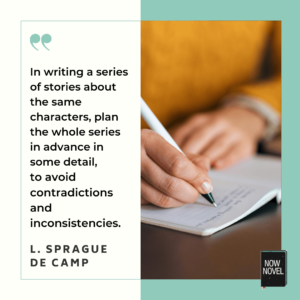Learning how to write a series presents several pitfalls. Here are 8 mistakes to avoid if you’re writing your first book series:
1. Choosing a series concept too thin for multiple books
Is your story idea big enough to stretch across multiple books? Would you be able to extend your character arcs and conflicts?
If you are writing in a genre like fantasy where series are popular, you may feel pressured to produce a group of books, but only do so if the story calls for it.
A big part of learning how to write a series is learning what themes and plot ideas will suit a more expansive treatment.
For example, consider a beloved fantasy series like Ursula K. Le Guin’s Earthsea books, in which a young wizard chases his sinister, escaped shadow across multiple lands. Or Tolkien’s classic fantasy novel cycle, The Lord of the Rings, where the hero Frodo’s quest (defeating the antagonist by destroying a powerful ring) spans multiple territories and side quests.
Before you get started, make sure that you have enough of a story concept. Use the free ‘Central Idea’ section of the Now Novel dashboard to develop a clear concept now.

2. Ending your series before main conflicts are complete
Sometimes series continue longer than necessary because an author is compelled by readers or simply their own passion for their characters to continue the story ad infinitum.
Before you start drafting the books in a series, think about where the natural end might fall. Even though there are multiple volumes, the same focus and sense being able to stand complete is necessary in every volume.
It may help to brainstorm a main conflict that will span the entire series (for example, Harry’s pursuit of the arch-villain in J.K. Rowling’s Harry Potter series). Then major secondary conflicts that connect to the main arcs (Harry comes up against various powerful allies of Voldemort’s throughout the series, who often crop up in unexpected places).
This will ensure that the main conflict can progress to a satisfying end while each book also feel complete in its own way.
This will help you avoid the next pitfall:
3. Not planning ahead
Planning may be a good idea for a standalone novel, but for a series it’s essential.
Spend time brainstorming characters out of your initial concept and your ideas for conflict so far. Think about where each might appear within the events spanning your series.
Many of these decisions will also occur as you draft, and the concept for each book changes slightly. This is a natural part of the drafting process. Yet having a sense of scope for each book will make your task much easier.
An overview-like document for each book idea will also help you to keep track of what information you’ve introduced, where.
4. Ignoring the passage of time
In learning how to write a series, it’s useful to examine how popular series authors treat time.
In the Harry Potter series for example, J.K. Rowling shows us Harry has a vulnerable kid, first heading off to school. As the books progress, we see teenage crushes and the other new conflict (internal and external) that come with puberty and navigating relationships.
Rowling’s character grew up as her middle-school readers did, provide a world of characters her readers could continue to empathise with and relate to. The passage of time was clear and affected characters’ arcs.
5. Being inconsistent with your series’ details
You may not always know what details you want to bring back from earlier books in the series.
You have to be consistent all the same, however, throughout your series even if that means constantly rereading and taking notes on earlier books.
You can’t have your character be an orphan in book one and go visit her father in book ten (unless she has some special power to commune with the dead).
Places cannot shift around and the basic details of your characters must remain the same across your series’ arc.
Keep an outline as you write. You can use the Scene Builder on Now Novel to create scene and chapter outlines, and link these to fuller scene drafts where you can edit individual details while keeping the overarching structure of your story taut.

6. Supplying insufficient intrigue and change
It’s possible to have too much consistency, too.
Characters must change. Change is the lifeblood of story.
Even in a long-running mystery series without a larger arc, your protagonist should not be exactly the same in book ten as in book one.
Think about yourself and the people you have known for many years. There are subtle shifts in attitudes, living situations, appearances and other qualities of character.
Consider the ways in which the events of each novel will alter your characters.
There are two more potential errors that can sink your series:
7. Abandoning important plot arcs
One of the key points of learning how to write a series is that subplots must be seen through to the end. Foreshadowing should build to something that justifies it.
Even if your series is a mystery series that features a recurring character rather than an arc, you still must still follow through. Some plot points will return throughout the series.
For example, a detective might have a father who is in prison. If this is dropped in at some point in the first book, the reader will expect that this will feature in subsequent books in some way.
8. Making your fictional world too limited
Write engaging settings and take sequels to new places. Make sure ‘who, what, why, where and when’ (the 5 w’s of story) change sufficiently across your series to keep your world dynamic.
A series requires long-form planning. The Now Novel Story Builder makes writing a book easier. Use the step-by-step process to create an easy-to-follow blueprint for your story.


16 replies on “How to write a series: 8 novice mistakes to avoid”
Great post – thank you! Quite pertinent for me, too, since I’m in the midst of writing a series, and long range planning is key…even for writers who are pantsers, which I am. I do keep reams of notes on details for consistency, but I think what has helped enormously in figuring out the arc of the series is that I knew from quite early on how this story would end. Whatever unexpected or interesting turns the pantsing may create in the short term, they have to (in some way) serve the story that ends the way it will end. If that makes sense? Probably not!
Hi Piper – It most certainly does make sense! So important to have a long-range plan. Sounds like you have it all sussed. Best of luck for the series.
B
It makes sense to me. The character often surprise you, or at least they do me. Good Luck. Let us know the name of the series. I think you pointed out some really good ideas in your 8 mistakes.
After ten novels for Pocket Books, I’m writing my first actual series. I’m a third of the way through the second story. Fortunately, I do have a plot for the the third. Unfortunately, it’s not flushed out yet. That scares me a little. One thing, when I get stuck, I write anyway, even if it’s nonsense, even if it’s not related to the story. I can always edit later. That’s what keeps me writing when I’m feeling like I have no idea what I’m doing. Which happens more often than I like.
Thanks for sharing your experience, Sue. 10 novels is already a great achievement. There’s truth in what you say, Maya Angelou said the same (she even said she’d write ‘The cat sat on the mat’ until ideas started to flow again!) Have a great year and good luck for the remainder of your current series.
I published a memoir a few years ago which did well, however, there was so much I left out because of page count restrictions, and of course, the importance of keeping the story moving. I’ve had many readers wanting more. I’ve thought about doing a series but have no experience. I could easily turn the chapters into short books. Do you feel this is doable with memoir? This is such a great post, thank you.
Hi Mandy, thanks for your question. I’m glad to hear the first memoir did well.
There’s no reason why you can’t write a memoir series. For example, the humour author and naturalist Gerald Durrell wrote a trilogy of memoirs about his family (‘My Family and Other Animals’, ‘Birds, Beasts and Relatives’, and ‘The Garden of the Gods’), about their relocation to the isle of Corfu, that did well.
Thank you for reading and sharing your thoughts. I’d say go for it!
Thanks, Bridget. That is very encouraging! I will check out trilogy memoirs now!
Another question: When writing a series, what is the recommended time for getting the next book in the series out? I know when I was reading the series Clan of the Cave Bear, I lost interest waiting years for that last book. I guess my question might be: What is the longest you should expect your reader to wait for the next book? and, should you have the first draft of the entire series finished before you put out the first book?
Hi Mandy – I wouldn’t say there are set rules about this. Individual publishers may have preferences, but typically it follows the pace at which the author is able to create! It’s a good idea to at least have a broad outline of the whole arc of your series, as that way each book can build to a longer arc that spans the whole series (or several arcs). As for audience – if readers are fans of the first, they will remember and patiently wait for subsequent installments. Some authors take years between sequels, others months.
The advantage of not having the entire draft of the series finished first is that you can be more flexible and write sequels after you’ve received helpful beta reader feedback on the first as well as seen market and publisher/agent response to the first installment. There’s a great post by Jane Friedman here on the ins and outs of publishing: https://www.janefriedman.com/start-here-how-to-get-your-book-published/
Good luck with your series!
Can you tell me if I have a good plan for my trilogy?
Book 1: Two mains go on a journey to gain support to overthrow the upcoming king, before he can kill my true main
Book 2: After failing in the previous book, the new tyrannical king comes into power, holds one main hostage, sends the other one to a prison-like place. Under his rule, horrible things happen because of his own beliefs and motives about how things should really be done. A rebel attack occurs and the first storyline comes into play again to get the current king out of power and fix the corrupted nation.
Book 3: A war from the events of the second book occurs, people die, and a new pure ruler comes into power and sets things right.
The only thing is, in the books, I want my characters to grow up, have love interests, have special development, introduce more characters for a bigger story, and stuff like that so that I can create a really nice epilogue into their future lives. I can’t do that with just three books, right?
I’ve been thinking about rewriting my first original story that happened to be a five part series. I knew I had to do a lot of planning but I’m having a hard time coming up with individual plots for each book and I no longer have the first two books to get their plots (if there was one; books 3-5 don’t really have plots). So far all I have is the overall plot: a young boy searches for his parents, he learns one of his parents went to the school he attends and they might’ve been taken by witches. I don’t remember why. I don’t remember what kind of school my protagonist is attending. Younger me either didn’t know or thought it didn’t matter… It should be fun trying to figure it all out.
When I read #4 I immediately thought about Ash from Pokemon. lol
Hi Joana – that’s interesting 🙂 What about it made you think of Ash?
I’m definitely keeping these tips in mind. This is a informative article.
Thanks for sharing.
It’s a pleasure, Georgia, thank you for reading our articles and sharing your feedback.